I was moved by the Channel 4 documentary on Hunting the Football Trolls featuring Jermaine Jenas. He had bravely spoken openly about his emotions and feelings on being targeted for racial slurs and hateful messages on social media. I applaud his bravery for speaking out. It brought it home to me how people could dehumanise others so easily, especially those that they do not know personally. It made me wonder how someone could objectify others without conscience.
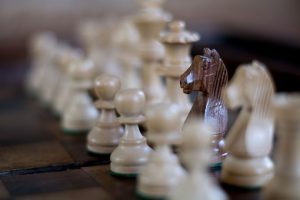 I understand racism, prejudices and discrimination because I had endured the pain and hurt myself, as a child growing up in the UK. I had never known it before, in Thailand where I was born. However, I had grown up thinking that as a minority, it must have been something that we (as the minorities) had to put up with. Not many people speak out about it thirty years ago. Not that I recalled. It was not okay then, and it is still not okay now. I am thankful that more and more people are spoken up about it.
I understand racism, prejudices and discrimination because I had endured the pain and hurt myself, as a child growing up in the UK. I had never known it before, in Thailand where I was born. However, I had grown up thinking that as a minority, it must have been something that we (as the minorities) had to put up with. Not many people speak out about it thirty years ago. Not that I recalled. It was not okay then, and it is still not okay now. I am thankful that more and more people are spoken up about it.
In this blog, I want to share my intrapsychic processes in dealing with any persons who objectify others. If you have been a subject of hate on social media or in person, you might find these processes helpful too. If you are experiencing racial attacks in your daily life, again, it might help to learn that you, too, can overcome their racial prejudices.
 In my experience, I found that individuals who personally attack others at their core being have a deficiently low sense of self-worth within themselves. They do not want others to know this and will put up a front by attacking others. After all, no one is going to be looking or noticing them. I had come to realise that the bullies were often bullied by others, and they were simply repeating learned helplessness behaviours by bullying, discriminating, racially attacking you. They had learned that they didn’t have a choice and was helpless to accept the situation. At their core being, they may feel insecure and hurting. They mimic the unacceptable behaviours believing that it must be powerful to do the bullying to others.
In my experience, I found that individuals who personally attack others at their core being have a deficiently low sense of self-worth within themselves. They do not want others to know this and will put up a front by attacking others. After all, no one is going to be looking or noticing them. I had come to realise that the bullies were often bullied by others, and they were simply repeating learned helplessness behaviours by bullying, discriminating, racially attacking you. They had learned that they didn’t have a choice and was helpless to accept the situation. At their core being, they may feel insecure and hurting. They mimic the unacceptable behaviours believing that it must be powerful to do the bullying to others.
Just a caution, the hypotheses below offers a psychological perspective of an inner working on one’s mind, both as a sufferer and as the perpetrator. It is not an excuse for any individuals and especially those that cause harm to others. It is a subjective supposition based on my experiences as a sufferer and from learned experiences with perpetrators. The purpose of highlighting their perspectives is to understand the underlying behaviours and the roles they inadvertently played in the “drama triangle”. The drama created in an insecure person is inadvertently played out in reality as they co-create the inner world, in the real world.
 Introducing drama triangle?
Introducing drama triangle?
The drama triangle is a psychological model that was first described by Stephen Karpman in 1961, who was a student of Eric Berne, the founding father of Transactional Analysis developed in the 1950s. Karpman explained the insidious nature of the psyche in which we all, unconsciously, play a part in the game of life. He went on to explain how we can fall victim to the roles in our life script. He also described how we could all get caught in the destructive cycle and struggle to break free from its toxic enmeshment. It did not begin with ourselves, but you can end the maintaining cycle. You do have a choice!
The purpose of discussing this theorem is not about blame but rather to highlight that we are all subjected to learned helplessness in its dysfunctional social interactions, which has increasingly become a problem in modern societies, especially on online social media platforms.
As mentioned at the beginning of this article, it begins with online abuse, trolling, hateful and abusive messages (directly or indirectly). It begins in the dysfunctional household in which warmth, love, and compassion are missing. It starts as self-defecation, self-loathing and self-hatred, and then it spreads outwards out of our pores infecting and targeting others. It was negatively reinforced into our being from adverse parental experiences of our parents. They may have been unconsciously ‘acting out’ what was normal within their household. And until we have an awareness of our misbehaving, we remain oblivious of our behaviours towards others. Let’s take a closer look at each of the roles in the drama that we participated in and helped co-created.
“We have a choice about the roles that we play in the game of life. Which part will you choose to play in your next role?”
As the victim (the suffers)
Generally, no one willingly, readily or consciously chooses to be a victim. It is something that is forced or happens to us. The sufferer often feels trapped, helpless and hopeless to do something about the situation. Especially when the abuse is online, social media sites are not proactive in dealing with the abuse. And especially, after you reported the abuse you may not see any real changes.
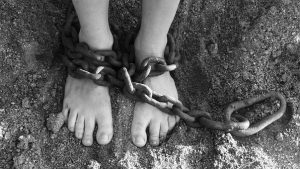 Being victimised predominantly begin in childhood. As a child, you may feel trapped when you are told off, reprimanded or abused by someone older/bigger and more powerful, usually a parent or an older sibling. As you internalised, you inadvertently assumed being powerless because you are smaller and have no power. You question your sense of worth and wonder why it happened to you. If you had no choice and could not venture out on your own, and you had to stay in a dysfunctional environment, it leaves you vulnerable to defend yourself against future attacks. You become learned helpless in situations and seek out other destructive engagements because it was familiar. This internalisation happens unconsciously to you. You had unwittingly become a victim because of your negative childhood experiences, negative reinforcement, abuse and cruelty.
Being victimised predominantly begin in childhood. As a child, you may feel trapped when you are told off, reprimanded or abused by someone older/bigger and more powerful, usually a parent or an older sibling. As you internalised, you inadvertently assumed being powerless because you are smaller and have no power. You question your sense of worth and wonder why it happened to you. If you had no choice and could not venture out on your own, and you had to stay in a dysfunctional environment, it leaves you vulnerable to defend yourself against future attacks. You become learned helpless in situations and seek out other destructive engagements because it was familiar. This internalisation happens unconsciously to you. You had unwittingly become a victim because of your negative childhood experiences, negative reinforcement, abuse and cruelty.
Being a victim DID NOT begin with you.
As the perpetrator (the abuser)
Individuals who were brought up in an abusive, oppressive, hostile, and critical environment may have inadvertently fallen into being a victim initially. They had helplessly learned what was normal in the abnormal and dysfunctional family system. They learned from their caregivers and mirrored their role as an abuser and persecutor. They learned to punish others by abusing them, to hurt others just as they were hurt.
 These individuals blame their victims for their own weaknesses. As a child, we could not and do not blame our parents for their misbehaving and misguided parenting. The child magically believed that their parents are Gods, according to John Bradshaw On the Family. The concept of magically thinking describes how a child idealises their parents within the family system. The child would not and could blame themselves as their cognitive functions are still developing. And if the child does not learn to take responsibility for their actions, they will grow up and continue to blame others for their flaws. Individuals with toxic and negative nurturing experience externalised behaviours such as physical aggression, verbal abuse, relational aggression, hate and acting out any forms of hostility and violence, physically, mentally, psychologically or verbally.
These individuals blame their victims for their own weaknesses. As a child, we could not and do not blame our parents for their misbehaving and misguided parenting. The child magically believed that their parents are Gods, according to John Bradshaw On the Family. The concept of magically thinking describes how a child idealises their parents within the family system. The child would not and could blame themselves as their cognitive functions are still developing. And if the child does not learn to take responsibility for their actions, they will grow up and continue to blame others for their flaws. Individuals with toxic and negative nurturing experience externalised behaviours such as physical aggression, verbal abuse, relational aggression, hate and acting out any forms of hostility and violence, physically, mentally, psychologically or verbally.
The majority of a bully or an abuser has been the subject of abuse themselves, which may be why they bully or abuse others to make themself feel superior, and to feel powerful. This is not an excuse because some people who were bullies had not resorted to becoming one themselves.
As the Rescuer (the helper)
Individuals who identify themselves as a rescuer will attempt to help the sufferers and intervene to save them from the bullies or the abusers. They suffer enormously from guilt if they do not interfere. They have a positive intention to help the person, but they could not see the consequence of their behaviours and may often worsen the situation. This individual has a strong desire to protect others, but it can keep the victim arrested in their development as they become dependent on the person to fight their battle.
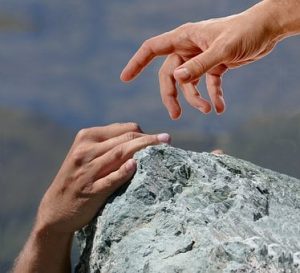 The Rescuer has a propensity to focus on helping and failing to see their unconscious gains. These unconscious gains include being good because one is needed or wanted, feeling important, feeling God-like, and feeling helpful or valuable, all of which satisfy the egoic mind.
The Rescuer has a propensity to focus on helping and failing to see their unconscious gains. These unconscious gains include being good because one is needed or wanted, feeling important, feeling God-like, and feeling helpful or valuable, all of which satisfy the egoic mind.
I had been bullied, verbally and mentally. I was bullied in the first two years of secondary school, and I found a way to stand up to the bullies. I was bullied because I was Thai and looked essentially different to the majority of white children in the class. I was a minority and could not speak English. It seemed like I was the easy target! As the only oriental at school, I was objectified and depersonalised.
It has not been on my conscience to pay it forward at any stage because I believed in karma. I remember thinking that it would not be fair to treat others in the same way because I didn’t like it. Thus, it is not always the case that those who were bullied become a bully.
I had been a victim; however, I never felt sorry for myself or thought why me. I thought, what’s wrong with you, rather than what’s wrong with me? What happened to you to be so mean? How did you come to be full of rage and hate? In cases of individuals who target others for their appearances, specifically online, they think it is safe to hide behind their masks and the internet. These individuals dehumanise, criticise and devalue someone often because they projected something they disliked within themselves onto others. It is far easier to mock them than it is to knock ourselves.
I had never been a perpetrator. It did not sit well with me morally, and I had never consciously wished harm onto another. If I was with someone that bullies others, I removed myself from the toxic person. If I don’t like something to be done unto me, I would not want it done onto thee. I considered the hurt and pain of the catcalls, and I cannot put anyone through any form of (verbal or physical) abuse. I do not want bad karma or the negative consequences of the law of attraction.
I am a rescuer. I want to help others and it was unsurprising that I am a counsellor/therapist. However, I had been compromised and thought that my good intentions were helpful and useful to others. It is true that there is a sense of satisfaction in helping and being in service of others. But, it can be a hinder to their development and growth if you take away the learning experiences for the individual.
“We learn by making mistakes. We learn from our pain and suffering. In light of those experiences, we grow and thrive as a unique spiritual being.”
How to break out of the drama triangle?
Here are some helpful tips on how to break free from the drama triangle. It is never too late to choose another role. You just need to remember that you DO have a choice. So, choose wisely.
Recognise your position in the drama triangle
Recognising whereabout you are on the drama triangle will help you to be aware of your role when you are relating to others. When you recognise your part, you can decide if playing in the triangle is helpful to you. We are all participants in the game of life, and how we play depends on our chosen role. We can challenge any position in life if they are no longer helpful. Once you realise that you have a choice, you can work toward breaking free from the confinement of the outdated role and step out of the drama triangle into a life worth living.
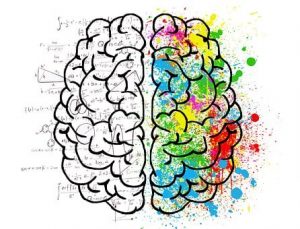 Be mindful and ask first, challenge later
Be mindful and ask first, challenge later
When you are mindful of others, you are less likely to jump to any form of illusion about what was said or who said what. On social media, we can easily misread, misunderstand and mis-take things the wrong way. In a mindful state, you will be prone to ask questions to find what more about what or why it was said. You would consider whether you understood the content or that the other person miscommunicated. Say: When you said that, what did you mean? Why did you say that?… I was hurt, upset, etc. What you said was untrue, insensitive, rude, hurtful etc.; why did you make those personal remarks? If you can be bothered to respond to the attackers. It is also safer and kinder to yourself to report, blocking them from seeing their contents entirely.
 Be curious
Be curious
Curiosity is one of the core traits of our inner child. Curiosity gives us a sense of inquisitiveness to explore further what someone meant. Communication is a two-way process, and misunderstanding can happen when we relate to each other, especially in writing. Curiosity requires an investigation and encourages further dialogue. If you are being bullied, ask the bullier why they are bullying you? Say: When you said that, it upsets me, hurt me; etc. When you spoke to me that way or write those things about me, I felt humiliated, shame, or that I felt bullied, etc.
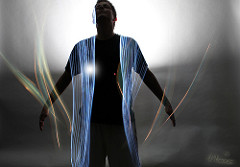 Stand firm and stand tall
Stand firm and stand tall
When you stand up for yourself against a bully, they may retaliate in response to your behavioural change. Your behaviour has consequences on others, just as you are influenced by another. However, standing firm and standing tall against any form of bullies or injustice is about facing up to and confronting the other. It is not an easy thing to do especially if it is unfamiliar to you. But, standing up for yourself may also be demonstrated in your body language, without words. Often when most of us face someone with bullish behaviour, we politely walk away. But, this might be an opportunity to stand your ground and test out your stance. It might be a look that says, you cannot treat me that way. It might be your long gaze at the person as they misbehaved. You can also consciously broadcast messages that say something like, you will not stand to be bullied, abused, violated, dehumanised, devalued etc. These are unspoken thoughts and convictions of your inner voice, speaking loudly in your psyche, directly project to the person as you continue to look at the individual. Standing firm online might include reporting it to the social media platform and the police. Standing firm might also include responding to the bullies and shaming them online and making them a focus rather than you.
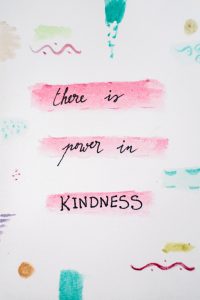 Rewind! And Be kind
Rewind! And Be kind
Kindness acts is a gesture of love for others. It shows that you are mindful and considerate of others, but not over your own needs. Kindness is powerful in relationship building and helps diffuse even the hardened mind. Kindness act is a balance of being considered and being equally important. A kind word can help lift someone’s day. Imagine how a kind act can help the person.
Making a change is never easy but it is not impossible. You can unlearn the way you used to do things, and relearn to do it differently. It may be unfamiliar to you but like anything worth doing, it will be rewarding.
As a final note, I just want to add that it is never okay to mistreat any other living beings. It is never acceptable to devalue, objectify, (verbally, mentally or physically) abuse or dehumanise anyone. After all, how would you like it if it happened to you?
It did not start with you, but it can end with you; you can change your beliefs, your mindset and your behaviours about something or someone. You can be the person who breaks the mould. Break the archaic societal rules embedded in the collective unconsciousness of rage or hate. Breakfree and break away from the racial, discriminatory and prejudiced trance.


 The purpose of mindfulness is to stay neutral to your experiences with the intention of staying with yourself. The idea is to be alert with a focused relaxation. Thoughts and abreactions in the body will arise. You may notice them and observe them without judgement. They will find that they will soon dissipate and disappear.
The purpose of mindfulness is to stay neutral to your experiences with the intention of staying with yourself. The idea is to be alert with a focused relaxation. Thoughts and abreactions in the body will arise. You may notice them and observe them without judgement. They will find that they will soon dissipate and disappear. In the state of mindfulness, your mental and physical state changes any chemical imbalances in the brain. It makes it rewarding and satisfying. This helps you see your inner resilience and inner strength as you successfully become mindful. You could instantly feel an improvement in your entire being. Eventually, you can feel confident in your achievement of being mindful. Before you know it, you are already motivated to keep practising mindfulness.
In the state of mindfulness, your mental and physical state changes any chemical imbalances in the brain. It makes it rewarding and satisfying. This helps you see your inner resilience and inner strength as you successfully become mindful. You could instantly feel an improvement in your entire being. Eventually, you can feel confident in your achievement of being mindful. Before you know it, you are already motivated to keep practising mindfulness. Mindful meditation requires you to sit in a meditative lotus posture, preferrable where you can be close to the ground for grounding and support. The combination of mindfulness and meditation is a marriage made in heaven. It is the most effective approach to a mindful state. You might want to explore using mantra words or statements to repeat silently during the meditation.
Mindful meditation requires you to sit in a meditative lotus posture, preferrable where you can be close to the ground for grounding and support. The combination of mindfulness and meditation is a marriage made in heaven. It is the most effective approach to a mindful state. You might want to explore using mantra words or statements to repeat silently during the meditation. Emotional awareness meditation concerns your feelings emotions. This approach of mindfulness meditation considers being with your feelings and emotions. However, you might already know that it is difficult to practice mindfulness meditation when an emotion grips you. But, this is the best time to use this technique. In a meditative and relaxed state, you can observe your feelings, name them, locate it in the body and bear with them much easier than in the heightened state. In a heightened state, you are reactive to the experience in the situation. In a relaxed state, you are non-reactive but responsive and aware of the emotions. If helpful, you can go into the meditation and recall an event where strong emotions arise. Practice being with your feelings and emotions. Observe them without judging or giving them narratives or meanings. Accepting them as being a part of you and having compassion for the way they had influenced your responses.
Emotional awareness meditation concerns your feelings emotions. This approach of mindfulness meditation considers being with your feelings and emotions. However, you might already know that it is difficult to practice mindfulness meditation when an emotion grips you. But, this is the best time to use this technique. In a meditative and relaxed state, you can observe your feelings, name them, locate it in the body and bear with them much easier than in the heightened state. In a heightened state, you are reactive to the experience in the situation. In a relaxed state, you are non-reactive but responsive and aware of the emotions. If helpful, you can go into the meditation and recall an event where strong emotions arise. Practice being with your feelings and emotions. Observe them without judging or giving them narratives or meanings. Accepting them as being a part of you and having compassion for the way they had influenced your responses. For example, when someone asked me to do something, I had previously thought it was a form of command because my experiences with authority have been negative.
For example, when someone asked me to do something, I had previously thought it was a form of command because my experiences with authority have been negative. In order to be connected to your inner world and find your inner sacred sanctuary, you got to want to know more about yourself.
In order to be connected to your inner world and find your inner sacred sanctuary, you got to want to know more about yourself. These acts of loving-kindness to others are false and unobtainable. It implies that you are kind and loving for sure, but you act and behave kindly and lovingly to others for the reciprocal acts. You cannot make anyone love you. But, we all do and try, and mostly in vain. This is because we have not learned to be kind and love ourselves first. It can take a long time to have Self-love, but we can begin with having kindness for ourselves.
These acts of loving-kindness to others are false and unobtainable. It implies that you are kind and loving for sure, but you act and behave kindly and lovingly to others for the reciprocal acts. You cannot make anyone love you. But, we all do and try, and mostly in vain. This is because we have not learned to be kind and love ourselves first. It can take a long time to have Self-love, but we can begin with having kindness for ourselves. Learning something new about yourself should be something that you like and find interesting. If you don’t like what you’re learning about yourself, then, you are not yet ready for this wondrous journey because you will learn some things that you might not like.
Learning something new about yourself should be something that you like and find interesting. If you don’t like what you’re learning about yourself, then, you are not yet ready for this wondrous journey because you will learn some things that you might not like. However, if you want growth and development, you do need to be flexible in your approach and processes. Being flexible and adaptable is a positive approach to dealing with the daily challenges of existence.
However, if you want growth and development, you do need to be flexible in your approach and processes. Being flexible and adaptable is a positive approach to dealing with the daily challenges of existence.

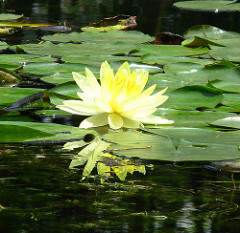
 Behaving and acting kindly come in many varieties. Behaving kindly includes giving way to someone coming the opposite way on a path, giving up your seat on trains or buses, offering someone you know a lift home. Showing helpfulness in teamwork, adapting a helpful mental attitude to a work colleague, illustrating helpful aptitude in community work are also helpful behavioural traits.
Behaving and acting kindly come in many varieties. Behaving kindly includes giving way to someone coming the opposite way on a path, giving up your seat on trains or buses, offering someone you know a lift home. Showing helpfulness in teamwork, adapting a helpful mental attitude to a work colleague, illustrating helpful aptitude in community work are also helpful behavioural traits. Helping and kindness come with rewards and self-improving moods. We can be creative in being kind without the other person knowing it. A kind act includes doing charity works or donations. In this way, we are acting kind, and we are not directly known. A kind act also includes cleaning up and clearing hazards. Picking a nail and keeping other road users safe is a kind act. Joining your local Wombles is an act of kindness in keeping your community clear and clean. Help elderly neighbours by doing their shopping, dropping off their groceries, or cooking them a meal. Help fellow mums at school and take their children to/from school, or offer to babysit. Offer your time and services in doing charity works is a kind act. Perhaps you can think of other creative ways to be kind.
Helping and kindness come with rewards and self-improving moods. We can be creative in being kind without the other person knowing it. A kind act includes doing charity works or donations. In this way, we are acting kind, and we are not directly known. A kind act also includes cleaning up and clearing hazards. Picking a nail and keeping other road users safe is a kind act. Joining your local Wombles is an act of kindness in keeping your community clear and clean. Help elderly neighbours by doing their shopping, dropping off their groceries, or cooking them a meal. Help fellow mums at school and take their children to/from school, or offer to babysit. Offer your time and services in doing charity works is a kind act. Perhaps you can think of other creative ways to be kind. Acts of kindness include sending kind messages to a significant person or someone needing love and appreciation. This person might be a work colleague, a friend or a family member. Writing them handwritten note shows that the kind words and considerations had been carefully thought about with affection. Call a friend or family and tell them that you care and have no other agenda than to say that. Spreading love is a kindness of the heart.
Acts of kindness include sending kind messages to a significant person or someone needing love and appreciation. This person might be a work colleague, a friend or a family member. Writing them handwritten note shows that the kind words and considerations had been carefully thought about with affection. Call a friend or family and tell them that you care and have no other agenda than to say that. Spreading love is a kindness of the heart.
 The people closest to you mean individuals nearest to you, as this may not be your immediate family. The people we choose to have around us impact our being. You might have lots of family members but may not live close to them. You might live closer to friends and work colleagues. The people around us influence our lives. Begin by appreciating those around you, that includes your neighbours and the community in which you live. After all, a part of you knows why you have chosen to live where you are. Start appreciating those people that are closest to you.
The people closest to you mean individuals nearest to you, as this may not be your immediate family. The people we choose to have around us impact our being. You might have lots of family members but may not live close to them. You might live closer to friends and work colleagues. The people around us influence our lives. Begin by appreciating those around you, that includes your neighbours and the community in which you live. After all, a part of you knows why you have chosen to live where you are. Start appreciating those people that are closest to you.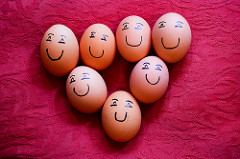 Fake it until you make it. It might seem like an effort and difficult to foster a smile. But, it is effortless. Curl your lips together and grin. Turn that frown upside down! Smiling and positioning our mouth into the smile helps to improve our moods as the body is ‘tricked’ into releasing cortisol and endorphins. We all know all the many benefits of these two magical chemicals in the body. But, did you know that it is also catching?
Fake it until you make it. It might seem like an effort and difficult to foster a smile. But, it is effortless. Curl your lips together and grin. Turn that frown upside down! Smiling and positioning our mouth into the smile helps to improve our moods as the body is ‘tricked’ into releasing cortisol and endorphins. We all know all the many benefits of these two magical chemicals in the body. But, did you know that it is also catching?
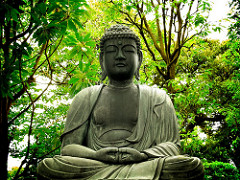 Acceptance is a concept of belief that recognises the validity of a thing or situation as it is. It is a conscious act with a positive intention for open-mindedness. It is to perceive something or a problem with a realistic view without judgement, assumption or supposition. In Psychology, acceptance is a catharsis, and it is a process of healing our cognition and emotion. But, if we can extend acceptance to all aspect of our lives and ourselves, we can come to a place of peace.
Acceptance is a concept of belief that recognises the validity of a thing or situation as it is. It is a conscious act with a positive intention for open-mindedness. It is to perceive something or a problem with a realistic view without judgement, assumption or supposition. In Psychology, acceptance is a catharsis, and it is a process of healing our cognition and emotion. But, if we can extend acceptance to all aspect of our lives and ourselves, we can come to a place of peace. Accepting what is is a personal challenge that I sometimes struggle with because mistakes happen in the reality of a situation, especially in a relationship. It is an ongoing process, and one should not place emphasis on achieving and then forgetting it. It is not about ticking the box, and you are done with it. But, the more you practice and adopt this way of being, the more familiar you will become with accepting things, situation, people, life and yourself.
Accepting what is is a personal challenge that I sometimes struggle with because mistakes happen in the reality of a situation, especially in a relationship. It is an ongoing process, and one should not place emphasis on achieving and then forgetting it. It is not about ticking the box, and you are done with it. But, the more you practice and adopt this way of being, the more familiar you will become with accepting things, situation, people, life and yourself. Mental health has been a challenge that has recently spiked on the global scale since the pandemic. It has long been a part of Western societies since the birth of psychiatry, and possibly longer than that. Mental disturbances are a challenge that poses psychological and physical discomfort in the individual. Mental disturbances can range from worrying about your loved ones to concern for their safety and welfare. It is any disturbances that are constructed in the mind. The longer we are exposed to these disturbances, the more problem it poses on our mental health. Thus, our mental wellness depends on the way we think and how we construct our inner world.
Mental health has been a challenge that has recently spiked on the global scale since the pandemic. It has long been a part of Western societies since the birth of psychiatry, and possibly longer than that. Mental disturbances are a challenge that poses psychological and physical discomfort in the individual. Mental disturbances can range from worrying about your loved ones to concern for their safety and welfare. It is any disturbances that are constructed in the mind. The longer we are exposed to these disturbances, the more problem it poses on our mental health. Thus, our mental wellness depends on the way we think and how we construct our inner world. Mental health awareness is the ability to develop compassion for ourselves and our mental construct as well as the mental capability of another. It is also about treating ourselves and others the way we would like to be treated. It is about watching our thoughts and thinking well of ourselves and others. Having an awareness of our thought processes give us realisation. In the realisation, we become compassionate with ourselves and how our mind works things out.
Mental health awareness is the ability to develop compassion for ourselves and our mental construct as well as the mental capability of another. It is also about treating ourselves and others the way we would like to be treated. It is about watching our thoughts and thinking well of ourselves and others. Having an awareness of our thought processes give us realisation. In the realisation, we become compassionate with ourselves and how our mind works things out. You are more than your mind. Therefore, you are more than the way you think and what you think. Thinking is just what you happen to do because the brain does not shut up. Thoughts will always intrude on the psyche. But, thought forms, and then they disappear. When you give focus, attention and meaning to the ideas, your thinking and other thought-forms arise to become problematic. It is at this point that having a
You are more than your mind. Therefore, you are more than the way you think and what you think. Thinking is just what you happen to do because the brain does not shut up. Thoughts will always intrude on the psyche. But, thought forms, and then they disappear. When you give focus, attention and meaning to the ideas, your thinking and other thought-forms arise to become problematic. It is at this point that having a 
 During the nocturnal hours, your body’s naturally crave sleep because your internal biological clock or the circadian rhythm is synchronised with the day/night cycle of the diurnal rhythm. The
During the nocturnal hours, your body’s naturally crave sleep because your internal biological clock or the circadian rhythm is synchronised with the day/night cycle of the diurnal rhythm. The 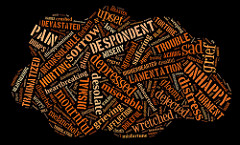 The inability to sleep or sleep well at night depends on your internal and external stressors, mental states, food that you have eaten and health condition. Many other factors also prevent us from sleeping, include anxieties, traumas and crises can interfere with our sleep habit as we lay down to rest. Unfortunately, this cacophony rings in our mind, and it can ruminate in the psyche as we sleep, becoming a nightmare that disrupts our natural healing process. If you take your woes to bed, when you close your eyes and managed to get a wink of sleep, it won’t be long before the problem invades your dreams. What you mentally think about will become your mental reality within the dream state.
The inability to sleep or sleep well at night depends on your internal and external stressors, mental states, food that you have eaten and health condition. Many other factors also prevent us from sleeping, include anxieties, traumas and crises can interfere with our sleep habit as we lay down to rest. Unfortunately, this cacophony rings in our mind, and it can ruminate in the psyche as we sleep, becoming a nightmare that disrupts our natural healing process. If you take your woes to bed, when you close your eyes and managed to get a wink of sleep, it won’t be long before the problem invades your dreams. What you mentally think about will become your mental reality within the dream state. Have a goal in mind for your bedtime (sleep time). This is a time that you want to be in bed, lights out, eyes shut and breathing easily.
Have a goal in mind for your bedtime (sleep time). This is a time that you want to be in bed, lights out, eyes shut and breathing easily. I firmly believe that rituals are helpful. Have a bedtime routine and pattern that you stick to help you build a structure around your sleeping habit. I cannot stress the importance of sticking to your routines and think positively about enjoying the mundane.
I firmly believe that rituals are helpful. Have a bedtime routine and pattern that you stick to help you build a structure around your sleeping habit. I cannot stress the importance of sticking to your routines and think positively about enjoying the mundane. I give myself around 10-15 minutes for relaxation. In that time, I may mediate or listen to soothing, relaxing music to ease myself to sleep. You might find my
I give myself around 10-15 minutes for relaxation. In that time, I may mediate or listen to soothing, relaxing music to ease myself to sleep. You might find my  By 23.00, lights out for me, regardless of whether my husband or I am ready. I turned off the light.
By 23.00, lights out for me, regardless of whether my husband or I am ready. I turned off the light.
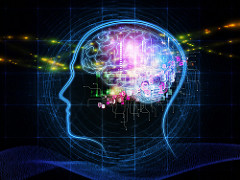 The mind never sleeps. The conscious mind is continually evaluating the input from our senses. The unconscious mind never shut off because it automates body regulatory, circuitry systems, such as keeping a steady sinus rhythm. Meditation is a state of being still in the body so that you can go within the psyche to observe thoughts, listen to what you are thinking about and notice comes up for you when cognitively being aware of what is in your mind. What you think you will manifest. Be sure to think only positive thoughts.
The mind never sleeps. The conscious mind is continually evaluating the input from our senses. The unconscious mind never shut off because it automates body regulatory, circuitry systems, such as keeping a steady sinus rhythm. Meditation is a state of being still in the body so that you can go within the psyche to observe thoughts, listen to what you are thinking about and notice comes up for you when cognitively being aware of what is in your mind. What you think you will manifest. Be sure to think only positive thoughts. A loving act for me includes feeling joyful, having fun and laughing at myself, lovingly. It is ultimately a knowing that you embrace with heart and soul. It is enough to say things like; I love my hair today, I love how I handle that argument today, I love the way I spoke my truth, even though not everyone agreed. It is quite alright to say; I love my voice, I love my flaws, etc. Whatever you dislike about yourself, try to reverberate your thoughts by expressing and vocalising your love, out loud.
A loving act for me includes feeling joyful, having fun and laughing at myself, lovingly. It is ultimately a knowing that you embrace with heart and soul. It is enough to say things like; I love my hair today, I love how I handle that argument today, I love the way I spoke my truth, even though not everyone agreed. It is quite alright to say; I love my voice, I love my flaws, etc. Whatever you dislike about yourself, try to reverberate your thoughts by expressing and vocalising your love, out loud. Water has healing nourishing and nurturing properties, which is why it is used in many religious rituals. Next time you are in the shower, feel the sensation of each water droplets on your skin.
Water has healing nourishing and nurturing properties, which is why it is used in many religious rituals. Next time you are in the shower, feel the sensation of each water droplets on your skin.